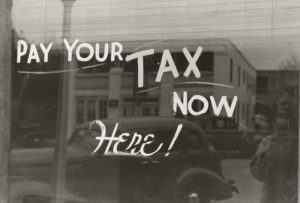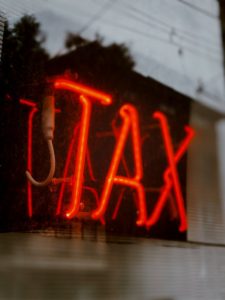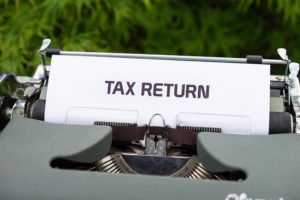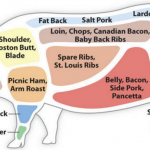Starting, owning and running any business can be a huge head ache as it is, as you may already know.
But it can made a heck of lot worse by ignoring the fundamentals of what is legal versus what isn’t.
That is why navigating the requirements necessary to be above board and legal right from the get-go is very wise.
Understandably it can all become quite overwhelming when starting any business, but the last thing you want is extra stress from failing to do your taxes.
Understanding Tax In Your Small Business For 2024 Click To Tweet
Do It Right And Get It Right!
Have you ever heard of the Dapper Don? John Gotti Jr. was the head of the Gambino crime family, an American Mafioso and boss in New York City. America’s most powerful crime syndicate. As with noted gangster Al Capone, Gotti was caught for tax fraud after he failed to file tax returns from 1984 through 1989. However, unlike Capone, John Gotti was also convicted on numerous other criminal counts, including murder, conspiracy, racketeering and obstruction of justice.
Why am I telling you this? Well, for one thing I am assuming that you aren’t in a similar kind of business model, nor would you aim to be, so that’s one tick for you, but you can still get charged for tax evasion or with tampering with your books.
So my advice is don’t do it. Don’t mess this up because it will affect your reputation and credit score.
That is why Understanding Tax In Your Small Business for 2024 is top of the pile.
Even if you you pay late you will have to pay penalties if you do not file your Company Tax Return by the deadline.
NOTE: If your tax return is late 3 times in a row, the £100 penalties are increased to £500 each.
“Income tax evasion penalties – summary conviction is 6 months in jail or a fine up to £5,000. The maximum penalty for income tax evasion in the UK is seven years in prison or an unlimited fine. Evasion of VAT – in magistrates court the maximum sentence is 6 months in jail or a fine up to £20,000″. – Patrick Cannon Barrister At Law @ Patrickcannon.net

Are You In The Picture A Bit More Now?
So that is why it will pay you to get this stuff right, right at the beginning so you don’t add to the already tricky pitfalls, losses and stresses that will inevitably be there.
Worth knowing: A Small Business owner may be required to pay several types of tax depending upon the type of business trader a person is.
What are these taxes known as?
Taxes can vary but they generally will include 1) VAT, 2) NI contributions, 3) income tax, 4) corporation tax, 5) small business rates, 6) capital gains tax, but as I mentioned just now – the tax you will personally need to pay can and will likely vary from another.
In what way?
Let’s say you hire others, or perhaps you work at a particular premises or even at home, then this could mean you pay taxes that others don’t, and conversely others may need to pay taxes you don’t need to pay in relation to their set up, processes, operation and systems of running a different kind of business. Never assume you know it all without due research. And ensure you are in a position where you are understanding Tax In Your Small Business for 2024!
Types Of Operation And How They May Vary Tax Wise
Don’t be a Wesley Snipes about this; Huh?
Yes, Hollywood’s very own Mr Snipes received a three-year prison sentence for failing to file income tax returns for six consecutive years and avoiding $7 million in taxes. Naughty boy, and it is unlikely that anyone escapes it, so no matter what type of business you wish to run or have started, don’t think you can outsmart anyone tax wise.
Just like in life ‘keep things simple’ as much as possible! Why? Because it causes less stress and headaches.
Ok enough fun, I will now give you examples of how different types of business operations work in the UK with this set up:
What Is Your Operation?
There are many types of operation generally for a Small Business, and this may include a medium sized business.
Small/Midsize operations can thrive in almost any industry, yet typically fall into the area of not requiring a great deal of employees, and will typically start smaller. Thus initial investment and capital will be lower, but not always.
Taken a look at these below:
SOLE TRADER
LIMITED COMPANY
LIMITED PARTNERSHIPS
These are the primary areas, however for more areas of business operation: click here to see the 8 typical types of business courtesy of Indeed.com
Ready to take notes?
- If you as a sole trader or if you as a partnership has sold any assets that have grown in value then this may incur Capital gains tax.
- A Limited Company will pay corporation Tax on its profits. And it will need to be set up immediately.
- Sole traders will pay income tax, just as partnerships will do.
- Partnerships will also require a need to submit separate tax returns. All tax returns must be filed by the date required.
- Employees in any given business will need to pay National insurance contributions.
- Plus you will have to pay NI contributions for having employees.
- You will also be required to register for VAT if you sell VAT based goods, and if your turnover is above the current limit.
- Then there are rates your business ‘may’ be required to pay if you have a specific premises for operation.
- You and or your accountant should keep up to date accurate records, so you are accountable for company accounts.
To be crystal clear on Understanding Tax In Your Small Business for 2024 and getting this right, by paying at the right time (as it really matters), visit: https://www.gov.uk/corporation-tax now, so you can be sure you know what to do, the right way.

Beware It’s The VAT Man/Woman/They Knocking!
What do they want?
Ummm, let me think!
Yes, they want your money of course, so now is the time to get to know what VAT is, and it’s time to start understanding Tax In Your Small Business for 2024.
And to become familiar with what it is for and applied to.
Did you know that Value Added Tax will be added to pretty much everything, when it comes to products and services?
That’s right, and, if you have a healthy Gross Revenue which is above the current limit, (which is awesome good job), meaning specifically that VAT registration and deregistration thresholds are at £85,000 and £83,000 respectively for at east a further two years from 1 April 2024, then you will need to become VAT registered.
But like with most things, there are still exceptions.
Did you know that some smaller enterprises that turn over less may still register for VAT though? Why? Because there are certain benefits in doing so.
This is explained in greater detail here by the wonderful Harper James legal Services:
https://harperjames.co.uk/blog/the-benefits-of-being-vat-registered/
Lets Go Deeper Into This
VAT further explained
Now, when your business is registered for VAT as you exceed the limit of revenue – which we just discussed, then you must charge it on ALL VAT applicable products and services.
This means you will be sending in your quarterly VAT return to HMRC. SEE HERE FROM GOV.UK
This will mean that at the end of each tax year you will be sent a tax bill for the total that you owe, and this is known as ‘output’ Tax.
There is also ‘input Tax’ which means you can ‘claim back’ VAT on certain products and services that you purchase.
Got that? Good!
Take note: If your ‘input tax’ is higher than your output tax, you can claim the difference back from HMRC in your VAT return. LEARN MORE ABOUT THAT HERE WITH ALTION LAW
And this is precisely why the small businesses owner might opt to register for VAT voluntarily. You see – you are starting to really
grasp why understanding Tax In Your Small Business for 2024 is critical.

Understanding Tax In Your Small Business for 2024
Now – what Are Business Rates You May Ask?
Business Rates will be charged on the majority of business premises, just so you know.
However, this will all depend upon your setup, operation and type of establishment.
For example, if you have a solitary confinement hole dedicated to an e-commerce business like a box bedroom or teeny lounge, which is increasingly commonplace in the modern world, then you may be exempt from paying this.
Understanding Tax In Your Small Business For 2024 Click To Tweet
Now, if you run a business significantly larger such as a commercial premises such as a dog grooming business covering the entire front of your property then you will likely need to pay it.
And – what is also considered here is what your property is worth.
Please also note: This bill can change over time and may well increase.
Here is Bristol City Councils Explanation of this: BUSINESS RATES EXPLAINED BRISTOL.GOV.UK
NOTE: The great news though is that there are Small business relief rates which apply to certain businesses!
You can learn more about which business properties may reduce bills by clicking on the link:
Understanding Tax In Your Small Business for 2024
More About NICS
Remember I talked about National insurance contributions?
Well, let me further explain how this works by Understanding Tax In Your Small Business for 2024.
If you are doing ok and you have decided to expand, and are sufficiently able to hire others, then you will be paying National Insurance Contributions on your employees wages.
The two general forms of NICS are: 1) Primary Class 1 NIC’s that are contributions made by the employee and 2) Secondary Class 1 NIC’s, which you will pay for employee benefits, this might include employee insurance, any costs and expenses claimed by the employee and whatever else falls into the Secondary Class 1 NIC category.
In total there are 4 ‘classes’ of National Insurance – which are as follows:
- Class 1a and 1b – Employers pay these directly on their employee’s expenses or benefits
- Class 2 – is a flat rate payable by the self-employed
- Class 3 – is voluntary contributions paid by those that wish to complete their NI record for specific benefit purposes, even though they are not liable to pay National Insurance
- Class 4 – is payable on any profits above a set level by the self-employed.
Still not sure you fully grasp this stuff? Don’t worry you can learn more about NICS at this link:
I have another juicy story! Have you ever heard of Leona Helmsley? She was a successful Hotel magnate, yet she was convicted in 1992 of evading $1.7 million in taxes, reported the Los Angeles Times. She was sentenced to four years in prison and 750 hours of community service. Oh dear, big mistake Leona!
Now Let’s Move Onto Limited Companies National Insurance
If you run a limited business, which means that you will be paying corporation tax on profits, you will take an income.
This could be either in the form of a salary or with dividends, and this will mean that you may need to pay income tax and NI contributions on this.
Why?
As you will likely be the director of your Limited company you will determine your salary, and this will be based around various factors, but if managed effectively you may be able to reduce the tax you pay on it. This is where an expert comes in, so even though I have barked on about this before, I cannot stress enough that you need a second experienced pair of eyes on your numbers.
Please note: This salary can affect your state pension, so it will pay you to work with your accountant to figure out what kind of salary would be best – based around all factors.
Understanding Tax In Your Small Business for 2024 - share on twitter to help others
Tip: Even if it pays you to take a lower salary for certain benefits, you may still add to this salary by taking dividends from profits.
What is a dividend? – A dividend is a payment a company can make to shareholders if it has made a profit.
CLICK HERE TO LEARN HOW TO BALANCE DIVIDENDS AND SALARY BY HWCA.COM
To learn more about your Earnings Limits, NI, Rates, Personal Allowances and Thresholds and to help determine Salary:
CLICK HERE TO LEARN MORE ABOUT RATES AND ALLOWANCES GOV.UK
CLICK HERE TO LEARN MORE ABOUT DIVIDENDS FROM INVESTOPEDIA.COM
Now, have you heard of Martha Stewart? She might be most remembered for her insider trading scandal, but she also had some back-taxes for income earned between 91 and 92, to the tune of $220,000. Oh dear! Now, Stewart’s didn’t think she owed the taxes because she had spent over 6 months ‘outside the state of New York’, living in Connecticut.
Unfortunately for her though this didn’t hold up in court. Bummer dude!
Understanding Tax In Your Small Business for 2024
I Have Said This Before Don’t Go It Alone!
I think the message is getting across now, no?
A quick personal story: I remember when I used to try and manage all of this to save myself costs and time, and I ended up overwhelmed by trying to run a business.
Sooooo.. I lost time and money by doing so, and it had the opposite effect!
And so I learned that in having a specific role, and also in allowing my partner to help me, I could focus my energy, skills and dynamic personality (sorry I got carried away there), on what mattered most.
In other words, I did what was important for me to do! Re-read that last sentence, absorb it and act upon it, as it is just about the most important sentence you may ever read about business.
Need further explanation?
- Do what is a priority every day in your business without fail!
- And if you don’t know what that is, hire someone who does!
Now I later decided that I could ‘save even
more costs’ by hiring a professional to tell me what I could save on costs.
Who would have thought it hey!
Admittedly though, I was dragged kicking and screaming to this decision, as I was fiercely independent, but it was worth it!
Therefore I can highly recommend from personal experience that you hire an a financial expert to help you understand how to manage your income, costs and so on, and also how to maximize what you can achieve every day from your business.
And in doing so, you will also learn to understand what can be deducted from your expenses and costs.
Yes there are potentially many tax-deductible costs! Cool huh!
CLICK HERE to see GOV.UK’s link to understanding what is tax-deductible.
I hope that this information has been useful to you. Please feel free to share, love and comment if you wish to and I will be happy to respond to any questions you may have.
Now I have a final story, I’m sure there are many others, but are you are of Gary Barlow? The multimillionaire Take That singer? Well this chap was exposed in 2014 as taking part in an ‘aggressive tax avoidance scheme, leading to calls for him to have his OBE removed. The reports suggested that the singer had invested several millions into two ‘music industry investment schemes’. However HMRC ordered him and others to repay £20 million in June 2016. Take that! Sorry, bad joke.
Understanding Tax In Your Small Business For 2024 Click To Tweet
Other useful Links That Can Help:
CLICK HERE FOR – The crypto tax UK rules small businesses need to know from simply business.co.uk
CLICK HERE FOR – Self Assessment: understanding the basics – www.litrg.org.uk

Understanding Tax In Your Small Business for 2024
I wish you the very best with understanding Tax In Your Small Business for 2024 and with continued growth and success in 2024.
Best
Greg
P.S. CLICK HERE TO READ ABOUT HOW TO HELP YOUR SMALL BUSINESS GROWTH WITH TIMELESS PRINCIPLES
-- Download Understanding Tax In Your Small Business for 2024 as PDF --













